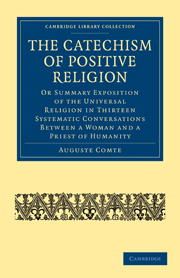 The Catechism of Positive Religion
The Catechism of Positive Religion Book contents
- Frontmatter
- PREFATORY NOTE TO THIRD EDITTON
- Contents
- PREFACE
- POSITIVIST LIBRARY
- HINT TO THE READER
- INTRODUCTION
- First Part EXPLANATION OF THE WORSHIP
- Second Part EXPLANATION OF THE DOCTRINE
- Third Part EXPLANATION OF THE REGIME, OR SYSTEM OF LIFE
- CONCLUSION: GENERAL HISTORY OF RELIGION
- CONVERSATION XII The Fetichist and Theocratic period common to all Peoples
- CONVERSATION XIII The Transition of the West
- TABLES
CONVERSATION XIII - The Transition of the West
Published online by Cambridge University Press: 05 October 2010
- Frontmatter
- PREFATORY NOTE TO THIRD EDITTON
- Contents
- PREFACE
- POSITIVIST LIBRARY
- HINT TO THE READER
- INTRODUCTION
- First Part EXPLANATION OF THE WORSHIP
- Second Part EXPLANATION OF THE DOCTRINE
- Third Part EXPLANATION OF THE REGIME, OR SYSTEM OF LIFE
- CONCLUSION: GENERAL HISTORY OF RELIGION
- CONVERSATION XII The Fetichist and Theocratic period common to all Peoples
- CONVERSATION XIII The Transition of the West
- TABLES
Summary
The Woman.—I understand thus, my father, the nature and the succession of the three great phases which belong to the necessary transition which separates us from the Homeric times. But I need a clearer understanding of their course and their connection, beginning with the Greek evolution.
The Priest.—Its imperishable brilliancy should not prevent you, my daughter, from regretting the contrast it offers in the general to the Roman evolution, as to the respective influence of each on its nation. In Rome, we are in contact with a collective construction, in which all free men must always take an active part, or the failure would be complete. In Greece, the people is in the main passive, and forms a kind of pedestal for some thinkers of real eminence, the total number of whom is not above one hundred, in art, philosophy, and science, from Homer and Hesiod to Ptolemy and Galen. On the one side, the high community of action stamps on the whole nation a nobleness of which the traces are yet distinguishable. But, on the other, the monstrous preponderance allowed to speculation over action issues in the degradation, too perceptible at the present day, of a population sacrificed to it which ended by assigning the first place to the gift of expression. Their conquest by Rome alone preserved the Greek cities from succumbing in every case to the despicable tyranny of some rhetorician.
- Type
- Chapter
- Information
- The Catechism of Positive ReligionOr Summary Exposition of the Universal Religion in Thirteen Systematic Conversations between a Woman and a Priest of Humanity, pp. 269 - 294Publisher: Cambridge University PressPrint publication year: 2009First published in: 1891


